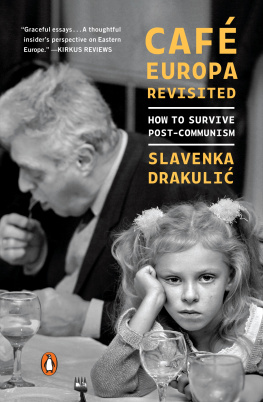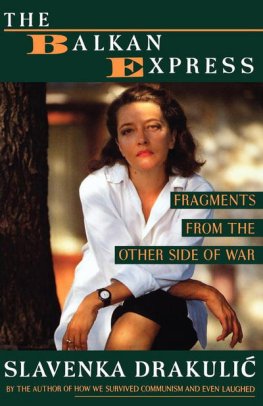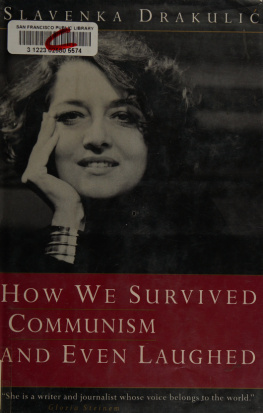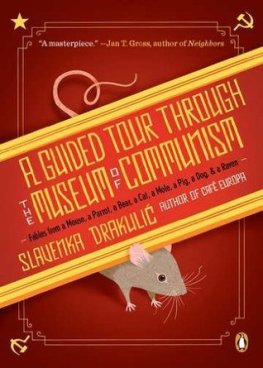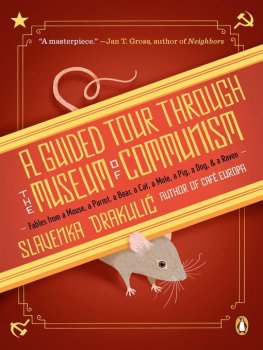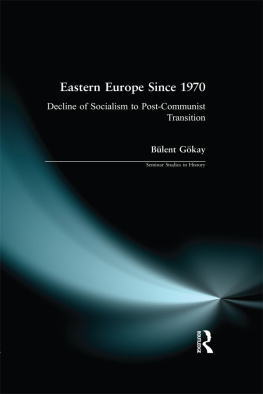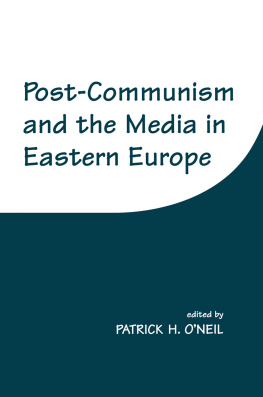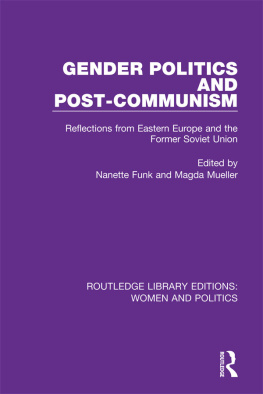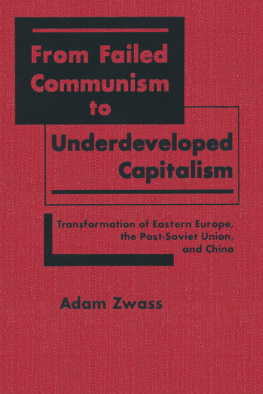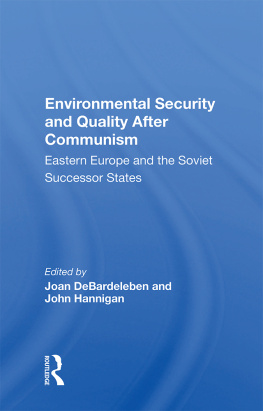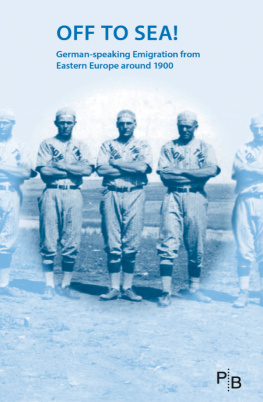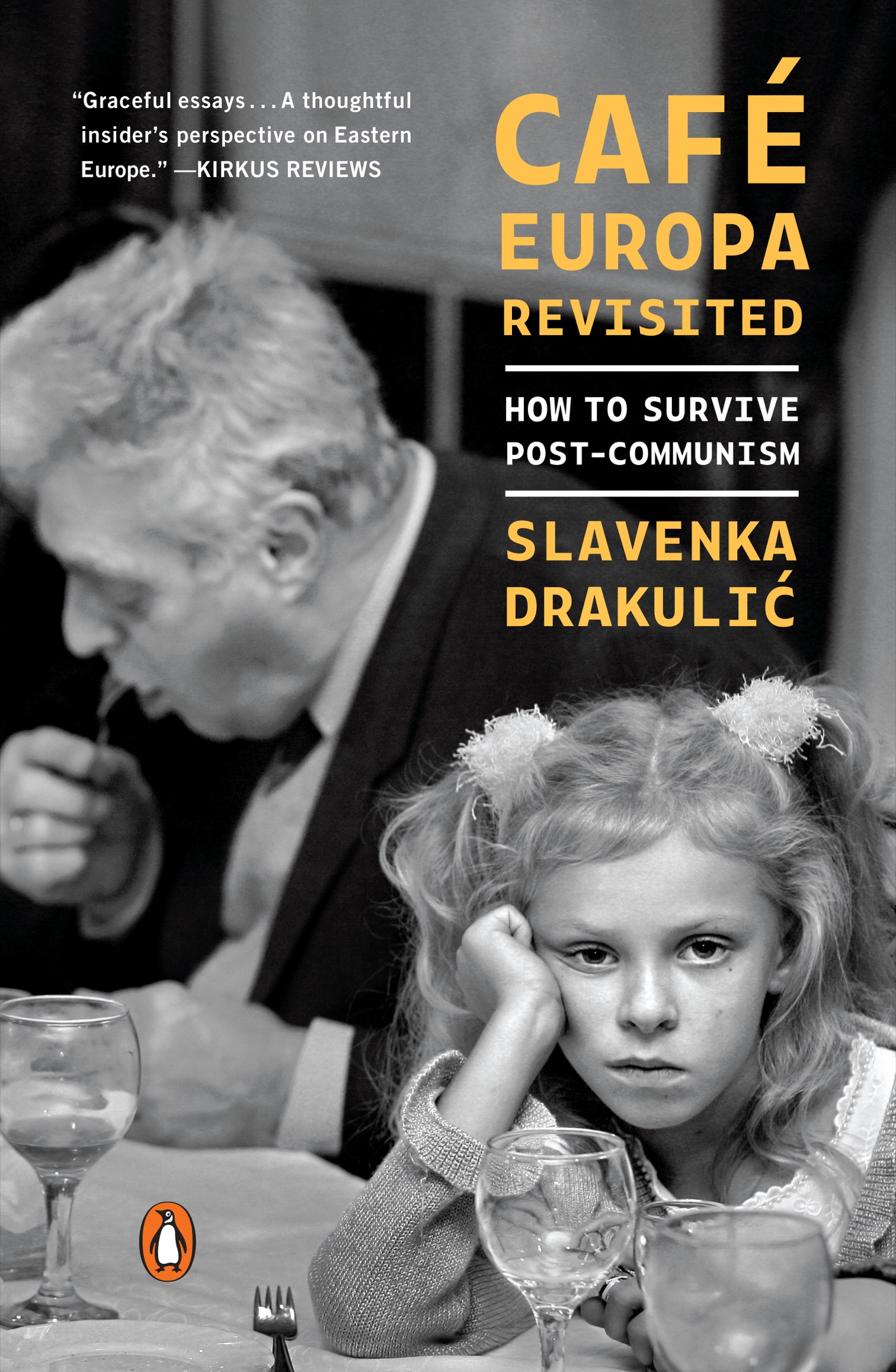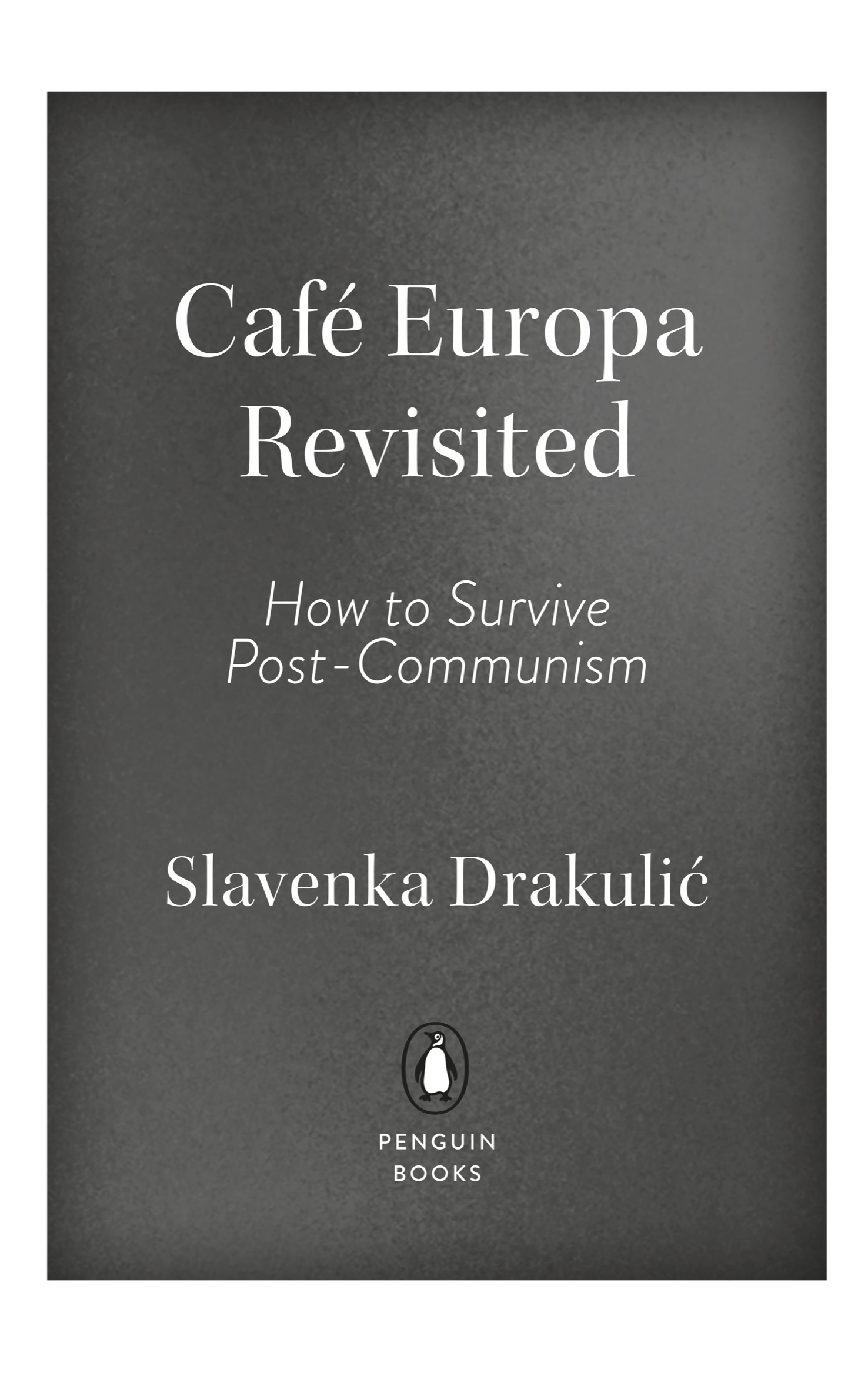Praise for Slavenka Drakuli
Slavenka Drakuli is a journalist and writer whose voice belongs to the world.
Gloria Steinem
Insightful... [Caf Europa] not only helps to illuminate the political and social problems facing much of Eastern Europe, but also sheds new light on the daily life of its residents, their emotional habits, fears and dreams.
The New York Times
Slavenka Drakuli is a writer of great sensitivity, intelligence, and grace.
Alice Walker
Drakuli is a perceptive and amusing social critic, with a wonderful eye for detail.
The Washington Post
[Caf Europa is] profound and often bitingly funny... youll never think about capitalism, modern history, or your perfect, white, American teeth in the same way again.
Elle
A formidable writer.
The Sunday Times (U.K.)
[A Guided Tour Through the Museum of Communism] beautifully renders the dilemmas of life under communism as sharp instances of moral tragedy and poignant examples of the limits of self-knowledge. Literature here is an aide-mmoire, not just of the historical experience, but of why we choose to forget.
Timothy Snyder, author of On Tyranny
PENGUIN BOOKS
CAF EUROPA REVISITED
Slavenka Drakuli was born in Croatia in 1949. The author of fifteen works of nonfiction and novels, including Caf Europa: Life After Communism and A Guided Tour Through the Museum of Communism, she has written for The New York Times, The Nation, The New Republic and numerous publications around the world.
PENGUIN BOOKS
An imprint of Penguin Random House LLC
penguinrandomhouse.com
Copyright 2021 by Slavenka Drakuli
Penguin supports copyright. Copyright fuels creativity, encourages diverse voices, promotes free speech, and creates a vibrant culture. Thank you for buying an authorized edition of this book and for complying with copyright laws by not reproducing, scanning, or distributing any part of it in any form without permission. You are supporting writers and allowing Penguin to continue to publish books for every reader.
The essays The Tune of the Future (2012), Once Upon a Time in 1989 (2017), and Fueling Fear (2018) were previously published, in different form, in Eurozine.
Letter on pages 7374 is reprinted courtesy of Samuel Abraham.
library of congress cataloging-in-publication data
Names: Drakulic, Slavenka, 1949 author.
Title: Cafe Europa revisited : how to survive post-communism / Slavenka Drakuli .
Description: New York : Penguin Books, [2021]
Identifiers: LCCN 2020026926 (print) | LCCN 2020026927 (ebook) | ISBN 9780143134176 (paperback) | ISBN 9780525505914 (ebook)
Subjects: LCSH: Post-communismEurope, Eastern. | Europe, EasternSocial conditions1989 | Europe, EasternPolitics and government1989
Classification: LCC HN380.7.A8 D73 2021 (print) | LCC HN380.7.A8 (ebook) | DDC 306.0947dc23
LC record available at https://lccn.loc.gov/2020026926
LC ebook record available at https://lccn.loc.gov/2020026927
pid_prh_5.6.1_c0_r0
For my daughter, Rujana, with love and gratitude
Contents
History without memory is impossible, but memory without history is dangerous.
T imothy S nyder, historian
It takes six months to replace a political system, six years to transform an economic system, and sixty years to change a society.
R alf D ahrendorf , sociologist
Introduction
No changes were foreseen
I wrote my book Caf Europa in 1996. Back then, I tried to illustrate the new Europe emerging after the entire communist bloc collapsedsuddenly and completely unexpectedly in 1989, a historical earthquake that left us Eastern Europeans in shock, followed by euphoria and childish expectations. Not a patient people, we expected too much too soon. Europe is not a mother who owes something to her long-neglected children; neither is she a princess one has to court [...] Most likely, Europe is what wecountries, peoples, individualsmake of it for ourselves, I wrote apropos these expectations.
On the thirtieth anniversary of the collapse, I revisit caf Europa to glance inside to see how the former communist world looks now. What are the important marks of the time and could we have anticipated them? Traveling around, I wonder: Do I have any right to write us and group together all the former Eastern bloc countries, just when they insist on the differences between them? Are there in fact any of us left? And finally, is thirty years a long or a short time when it comes to profound changes in a society?
Let us stick to the metaphor of a caf. Like in any caf, the first thing you feel when you enter it is the atmosphere. Atmosphere is, of course, immaterial, only a feeling of the place. Thirty, twenty, even ten years ago you would have sensed excitement, hope, good vibrations in the air.
The caf or rather kavana, kavarna, kvhz, kawiarniaas this unique Central European institution is called in different languagesused to look a bit shabby, the lights were dimmed, many people smoked. But they had loud voices and smiling faces, the glasses clanged and you could tell that there was a kind of party going on.
Nowadays, as soon as you open the door, the first thing you would notice is that there is new furniture, modern appliances, a lot of light, the coffee is espresso now, and nobody reads old-fashioned newspapers any longer. The caf looks designed, more like a bar than an old-fashioned kavana. The people look smarter than before too, they are certainly better dressed, but there is less noise. Yet a trained eye can distinguish different groups and different tones, even polite disagreements. Many of the visitors, especially if they are older, complain about the corrupt elites, unfulfilled promises, loss of national identity and loss of job securityas well as the stripping away of illusions. This is how you can recognize that they are Eastern Europeans. Young ones are the same everywhere, they move around in order to get a job and worry mostly about money. The Westerners in the caf also had expectations: they believed that once the political and economic system had changed, the post-communist countries would develop fast and the gap within a reunited Europe would soon closewhen you look around, you can recognize them by the disappointment on their faces.
Sitting there awhile, you come to understand that what connects people in post-1989 Europe is common valueswhile what continues to divide them is different histories. Only time alone could ever bridge this gap and thirty years are but a blink.
If someone had told me fifty years ago that I would see communism collapse in my lifetime, I would have probably laughed, albeit bitterly. Living in Eastern Europe, though not in a country within the Soviet bloc but in the former Yugoslavia, my generation could imagine only more of the sameor worse. Back then, George Orwells anti-utopian novel 1984 was a book we admired because we recognized the Newspeak, control and censorship that he described. We had already surpassed his Animal Farm, in which we are all equal but some are more equal than others, as well as the reversal of such values as truth and peace. Seeing the student protests in Paris in May 1968 and the Soviet tanks rolling into Prague in August the same year could only reinforce the differences between political systems and our feeling of hopelessness. No change for the better was foreseen

